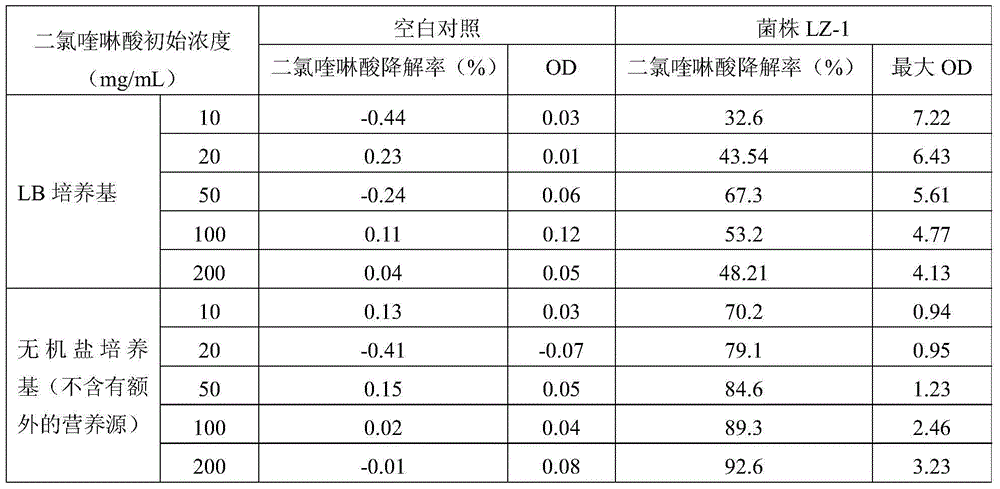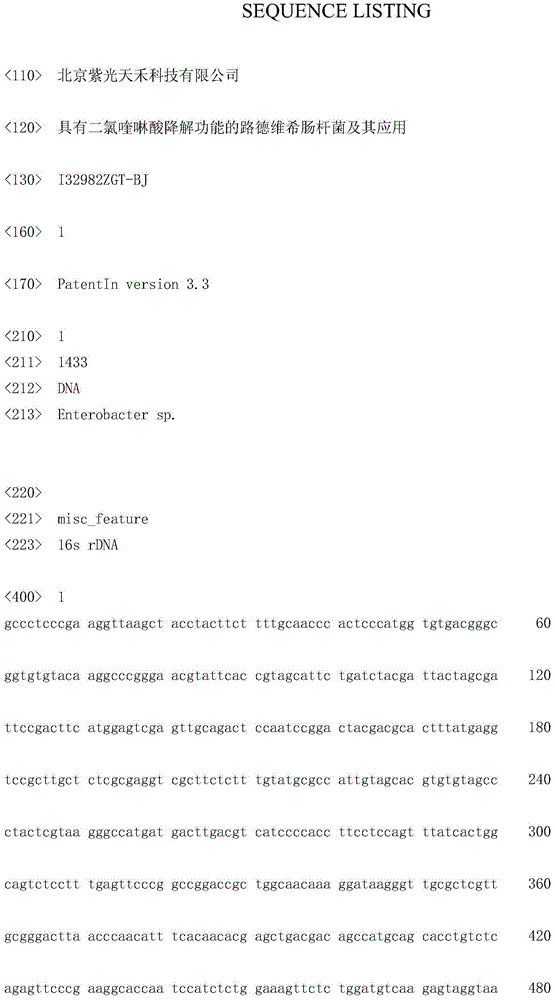Enterobacter ludwigii with quinclorac degradation function and application thereof
A technology of Enterobacter ludwig and Enterobacter dewighi, applied in the field of degrading quinclorac, can solve problems such as adverse effects on the growth and quality of flue-cured tobacco, economic loss in tobacco leaf production, etc., and achieve high tolerance and degradation ability , strong vitality, fast growth effect
- Summary
- Abstract
- Description
- Claims
- Application Information
AI Technical Summary
Problems solved by technology
Method used
Image
Examples
Embodiment 1
[0045] This example is used to illustrate the tolerance and degradability of Enterobacter ludwigii provided by the present invention to quinclorac in water
[0046] The strain LZ-1 was inserted into the LB liquid medium containing 10mg / L, 20mg / L, 50mg / L, 100mg / L, 200mg / L quinclorac after sterilization with an inoculum of 1% by volume. middle. Cultured at 170rpm and 30±1℃ for 24h, the results showed that the strain LZ-1 showed good tolerance to quinclorac, and the strains could grow in different media. The maximum OD value that the bacteria can reach and the degradation rate of quinclorac are shown in Table 1.
Embodiment 2
[0048] This example is used to illustrate the tolerance and degradability of Enterobacter ludwigii provided by the present invention to quinclorac in water
[0049] The strain LZ-1 was inoculated into the inorganic salts of quincloracic acid with concentrations of 10mg / L, 20mg / L, 50mg / L, 100mg / L and 200mg / L after sterilization with an inoculum of 1% by volume. base. Incubate at 170rpm and 30±1℃ for 24h. The results showed that the strain LZ-1 showed good tolerance to quinclorac, and the strains could grow in different media. In the case of taking quinclorac as the only carbon source, the maximum OD value that the bacteria can reach and the degradation rate of quinclorac are shown in Table 1.
Embodiment 3
[0057] This example is used to illustrate the degradation of quinclorac in soil by Enterobacter ludwigii provided by the present invention
[0058] The strain LZ-1 was inoculated into 100 mL of LB liquid medium at 1% by volume, and after culturing at 175 rmp for 24 h at 30 ± 1 °C, the bacterial liquid was added to 5 kg containing 20 mg / kg of quinclorac. In the soil, stir evenly and cultivate for 7 days to ensure that the water content in the soil is about 20%. Finally, the content of quinclorac in the soil is detected. The results are shown in Table 2.
PUM
 Login to View More
Login to View More Abstract
Description
Claims
Application Information
 Login to View More
Login to View More - R&D
- Intellectual Property
- Life Sciences
- Materials
- Tech Scout
- Unparalleled Data Quality
- Higher Quality Content
- 60% Fewer Hallucinations
Browse by: Latest US Patents, China's latest patents, Technical Efficacy Thesaurus, Application Domain, Technology Topic, Popular Technical Reports.
© 2025 PatSnap. All rights reserved.Legal|Privacy policy|Modern Slavery Act Transparency Statement|Sitemap|About US| Contact US: help@patsnap.com



